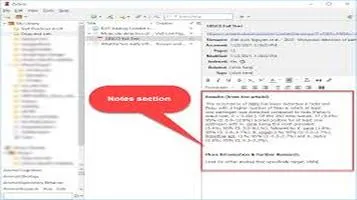Zotero: A Comprehensive Review of the Online Bibliography Tool
Zotero is a versatile, open-source reference management tool designed to help researchers and students organize and cite their sources with ease. It allows users to collect and manage bibliographic data, such as books, articles, and websites, directly from their web browser. With Zotero, users can create a personal library of sources, complete with tags and notes for easy retrieval. The tool also supports collaborative projects by enabling shared libraries among groups. Zotero seamlessly integrates with word processors like Microsoft Word and Google Docs, enabling quick insertion of citations and automatic generation of bibliographies in various citation styles. Its user-friendly interface and robust features make Zotero an essential tool for anyone engaged in research or academic writing.

In the digital age, managing references and bibliographies has become a pivotal aspect of academic and professional writing. Among the myriad of tools available, Zotero stands out as a robust, versatile, and user-friendly solution. Developed by the Roy Rosenzweig Center for History and New Media at George Mason University, Zotero has garnered a significant user base since its inception in 2006. This review delves into the features, strengths, and limitations of Zotero, providing an in-depth analysis of its utility as an online bibliography tool.
Interface and Usability
One of Zotero's most appealing aspects is its intuitive and clean interface. The tool is designed to be user-friendly, catering to both novice and experienced users. The main interface is divided into three panes: the left pane displays your collections and tags, the middle pane lists items in the selected collection, and the right pane shows detailed information about the selected item. This layout makes it easy to navigate and manage your references.
Zotero also offers browser extensions for Chrome, Firefox, and Safari, enabling users to save references directly from web pages with a single click. This feature is particularly useful for researchers who frequently gather information from online sources. Additionally, the Zotero Connector can automatically download PDFs and save snapshots of web pages, ensuring that you have access to the full text of your sources even if the original content is altered or removed.
Organization and Management
Zotero excels in its ability to organize and manage references. Users can create collections and sub-collections to categorize their references systematically. The tagging feature allows for further customization, enabling users to label references with keywords for easy retrieval. This hierarchical organization system is particularly beneficial for large projects with numerous sources.
Moreover, Zotero's search functionality is robust, allowing users to perform quick searches or advanced searches based on specific criteria. The tool also supports the attachment of notes to references, which can be useful for annotating sources with personal insights or summaries.
Collaboration and Syncing
In today's collaborative research environment, Zotero's syncing and sharing capabilities are highly valuable. Users can sync their libraries across multiple devices, ensuring that their references are always up-to-date and accessible. Zotero's cloud storage is generous, offering 300 MB of free storage for PDFs and other files, with options to purchase additional storage if needed.
Zotero's group libraries facilitate collaboration by allowing users to share collections with colleagues. This feature is particularly useful for research teams, enabling them to work together seamlessly. Group members can add, edit, and annotate references, ensuring that everyone has access to the most current information.
Citation and Bibliography Generation
One of Zotero's standout features is its ability to generate citations and bibliographies automatically. The tool supports a wide array of citation styles, including APA, MLA, Chicago, and many more. Users can easily insert citations into their documents using the Zotero Word or LibreOffice plugins. This feature streamlines the writing process, saving time and reducing the risk of citation errors.
Additionally, Zotero's citation style editor allows for customization of citation styles, catering to specific publisher or institutional requirements. This flexibility ensures that users can adhere to the precise formatting guidelines of their target publications.
Integration and Compatibility
Zotero integrates seamlessly with other tools and platforms, enhancing its overall utility. In addition to its browser extensions and word processor plugins, Zotero offers integration with popular reference management tools like EndNote and Mendeley. This interoperability allows users to import and export references between different systems, facilitating a smooth transition for those switching to Zotero from other tools.
Furthermore, Zotero's API enables developers to create custom applications and plugins, expanding the tool's functionality. This open-source nature fosters a vibrant community of users and developers who contribute to the tool's continuous improvement.
Limitations
Despite its many strengths, Zotero is not without its limitations. One potential drawback is its reliance on cloud storage for syncing and sharing. While the free storage quota is adequate for many users, those with extensive libraries may need to purchase additional storage. Additionally, the tool's performance can be affected by the size of the library, with larger libraries potentially causing slower response times.
Another limitation is the occasional inconsistency in metadata retrieval from web sources. While Zotero's browser extensions are generally reliable, they may sometimes fail to capture accurate metadata, necessitating manual corrections.
Conclusion
Zotero is a powerful and versatile online bibliography tool that offers a comprehensive suite of features for managing references and generating citations. Its user-friendly interface, robust organization capabilities, and seamless integration with other tools make it an invaluable resource for researchers, students, and professionals alike. While it has a few limitations, they are relatively minor compared to the tool's overall benefits. For anyone seeking an efficient and reliable solution for reference management, Zotero is undoubtedly worth considering.






